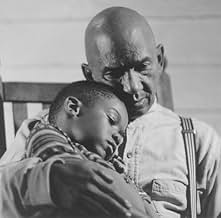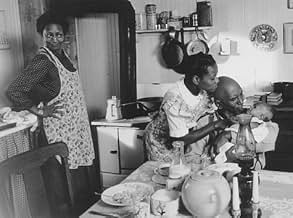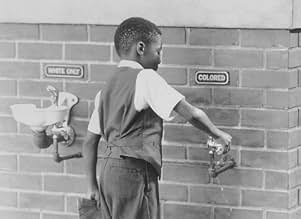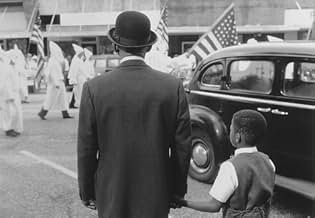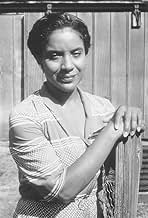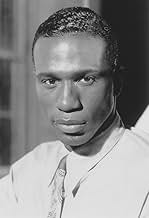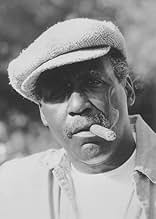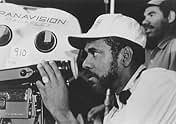Adicionar um enredo no seu idiomaA narrator tells the story of his childhood years in a tightly knit Afro-American community in the deep south under racial segregation.A narrator tells the story of his childhood years in a tightly knit Afro-American community in the deep south under racial segregation.A narrator tells the story of his childhood years in a tightly knit Afro-American community in the deep south under racial segregation.
- Direção
- Roteiristas
- Artistas
- Prêmios
- 3 vitórias e 2 indicações no total
Salli Richardson-Whitfield
- Miss Alice
- (as Salli Richardson)
Ray J
- Cliff (12 Yrs.)
- (as Willis Norwood Jr.)
Frank Hoyt Taylor
- Straw Boss
- (as Frank Taylor)
- Direção
- Roteiristas
- Elenco e equipe completos
- Produção, bilheteria e muito mais no IMDbPro
Avaliações em destaque
"Once Upon a Time... When We Were Colored" is a nice movie. It's tame, calm, and largely uneventful which makes it nothing more than nice. It's about a Black boy's growing up in the South during the Jim Crow era. It's devoid of any real drama considering we're talking about Black folks trying to survive in the South. The movie has some fine actors in it and I believe they did the best they could with the script. Unfortunately, it was a weak script. I think this movie would've done well as a book, but not all books need to be made into movies.
I am very fond of this film, and I have had the opportunity to hear Clifton Taulbert speak in person. I think the point of the film is that while black people who had to endure much during the 100 years that followed the civil war they still managed to create many supportive communities. In addition there were good role models for young people like Clifton Taulbert. As a response to the undeniable oppression, the black community of Glen Allen, Mississippi, bonded and supported one another. It did, in fact, mean that their lives were made less miserable. They experienced joy and fellowship as well as oppression. They refused to take on victim-hood as an identity. At the same time, there was a vigorous challenge to the status quo. I don't think the movie is too sentimental, or inaccurate.
I have shown this movie to students many times and it has never failed to move them to a real concern for the condition of minorities. It reaches these students on an emotional level, and it gets them interested in learning more about the issue of human rights. That is no small feat.
I have shown this movie to students many times and it has never failed to move them to a real concern for the condition of minorities. It reaches these students on an emotional level, and it gets them interested in learning more about the issue of human rights. That is no small feat.
"Once Upon a Time When We Were Colored" (1996): Set in the deep American South, over the years 1946-1962, and told as biography, this is the story of one boy's memories of being raised in the Cotton & Bible Belt. He's poor, his family is in pieces, he's Black, he's surrounded by the KKK
and yet, this is a soft, even soft-focus look back at the people who DID provide community family, did not dwell on their poverty nor make their race the focal point of a normal day. We are so accustomed to angry, relentlessly violent films about the racial divides, this film could easily be taken as a Hallmark Card presentation
but SOMETHING about it tells me otherwise. Yes, problems are depicted, and yes, the times they were a-changin', but not as fast or dramatically as we've come to accept from the quick flip of a few pages in history class. I LIKE the pace of this film. It's slow, warm, often funny, occasionally sugary, sometimes sad or maddening, but for the most part it's a nostalgic look back at the GOOD parts of black author's childhood.
I kept waiting for the bad moments to happen, as so often they do in these reminiscent movies of growing up in the south, yet no real drama occurred. These were moments pieced together, and if that was the intent--it worked. True, a child's reflection of childhood would be pieces of memory chained loosely together, impressions of events, people, and times. However, when the movie ended I thought, "That's it?" There were fine performances; however, the plot seemed to soft-step around the real issues, such as the Jim Crow laws, segregated schooling, subservient wages, and escaping to the north to avoid the subjugation. We got breadth, when depth might have made a much more interesting plot line.
The author's stated intention was to show the family that nourished him and protected him from the world of hatred and segregation. The film showed just enough of the segregated life to let the viewer know that Cliff needed to be protected from that world and nurtured to overcome the scars that outside world could inflict. I think Taulbert and the movie did a good job of showing how the love of his immediate and extended family could compensate in some way for the hatred and oppression of the outside world. I hate to see the movie berated for not being a documentary of all the hateful excesses of the segregated South when that was not the movie's intent. We have films that are considered classics that are about different parts of World War II, and they don't document all the atrocities of the Holocaust. Not focusing on parts of an era that are not the main point of the film is not "sugarcoating." It's an excellent film about growing up in a loving family and overcoming challenges through the love and support of others. It's fine the way it is.
Você sabia?
- CuriosidadesWhen Melvin tells the group of elders all the benefits of living up North, he says that Colored men even drive buses. Preacher Hurn replies "Shut yo' mouth!" Isaac Hayes wrote the theme to Shaft (1971), and Richard Roundtree played the titular character.
- Trilhas sonorasMaybe Tomorrow
Written and Performed by Lionel Cole
Principais escolhas
Faça login para avaliar e ver a lista de recomendações personalizadas
- How long is Once Upon a Time... When We Were Colored?Fornecido pela Alexa
Detalhes
Bilheteria
- Faturamento bruto nos EUA e Canadá
- US$ 2.291.255
- Fim de semana de estreia nos EUA e Canadá
- US$ 75.675
- 28 de jan. de 1996
- Faturamento bruto mundial
- US$ 2.291.255
Contribua para esta página
Sugerir uma alteração ou adicionar conteúdo ausente


